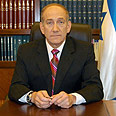
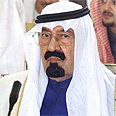
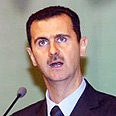
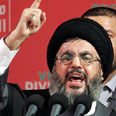
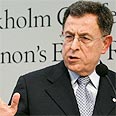
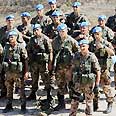
Should one believe Prime Minister Ehud Olmert when he says that he was stunned to read Yedioth Ahronoth's leading story heralding that he had met a senior Saudi official – perhaps King Abdullah himself?
In a special interview with Ynet on Monday, Olmert systematically denied the report, charging that the Israeli press has "a speculative imagination."
While he denied having held talks with Saudi officials, Olmert expressed a crystal clear position on Syria. President Bashar Assad, he says, is not a partner in peace for the time being.
The prime minister brushed aside Syria overtures towards Israel as political maneuvers to ease mounting international pressure on Syria to play a more constructive role in the Middle East.
As for Hizbullah leader Hassan Nasrallah, Olmert believes the fiery Shiite cleric is in no better situation than his Syrian patron, despite a high turnout for his 'victory' speech on Friday.
Mr. Prime Minister, what can we say about reports that you met with Saudi officials?
"Unfortunately, very little. I neither meet the Saudi King nor any other official who should touch off sensations in the press. In one of the interviews I granted ahead of the holidays, I was asked by a reporter about the Saudi initiative. I used the opportunity to say what was already a known fact: The Saudis adopted a very appropriate policy on the war in Lebanon. I wanted to express the Israeli government's appreciation of that fact.
Beyond that, I didn't meet Abdullah, I didn't travel, they didn't come to me, I held no meetings. The rest is imagination and speculations."
You didn't meet a Saudi official during….
"Nothing of the kind ever happened. (Later in the interview) The Saudi position during the war in Lebanon attested to responsibility and judgment, which created a good feeling among us. Since we always condemn countries like Saudi Arabia in our public remarks, I thought that the way in which it acted during the war requires a different response. The difference is sharp between this and drawing conclusions."
Let's turn to the post-war Lebanon. When you saw Hizbullah leader Hassan Nasrallah celebrating in Beirut's Dahiya on Friday – what did you feel?
"I did not see it. Had I seen it, I wouldn't have been moved by it. Nasrallah's need of this show of force by the masses is a consequence of the increasing anger toward him and the growing opposition against him in Lebanon. This doesn’t mean a thing. I am not impressed by it.
"I must tell you that my natural association is that such declarations and demonstrations by Arab leaders, who live in non-democratic societies, always have something to do with the need to survive anger or disagreement or increasing criticism."
"I believe that things are really changing in Lebanon. I think it is very difficult not to see that. Nasrallah can hold shows in Beirut and can get more than 200,000 there because there are no houses there, one must remember. But in southern Lebanon not one Hizbullah member is seen carrying weapons. One cannot crush all the weapons they have, but it cannot be activated and sent, with the reality of 3,000 multinational force soldiers and 15,000 Lebanese army soldiers….
"For two months or a month and a half since the end of the war there has been no smuggling. Something happened, gentlemen, we must open our eyes, something happened that today Hizbullah and Nasrallah are outcast inside Lebanon. Something happened, that today the moderate Arab states are coming out against this radical Shiite extremism."
Do you believe Nasrallah should be dead?
"Nasrallah is an enemy, he is not friend."
Regarding the three Israel Defense Forces soldiers abducted by Hamas and Hizbullah, Olmert preferred to remain succinct.
"Regarding Gilad Shalit, Eldad Regev and Ehud Goldwasser, words are unnecessary. Shalit's issue is sensitive, and I don't want to further complicate a matter that is inherently complicated and sensitive. I don't think I'll contribute to efforts for his release by speaking. The will to release him is so strong and stirring that I'd rather not speak."
Would Israel have to release hundreds or thousands of prisoners in return for the kidnapped soldiers?
"Part of the solution to the problem is to refrain from issuing models and frameworks for negotiations."
Would a prisoner exchange deal include the release of Marwan Barghouti and Ahmad Saadat?
It includes all kinds of funny things. It sounds funny to me."
You said Nasrallah is an enemy. Is Fouad Siniora, the Lebanese Prime Minister, a potential peace partner?
"I can't point to contacts being held with Fouad Siniora. In principle I don't rule out that option, to the contrary. I would have viewed the matter positively if Siniora would hold direct contacts with me if only regarding UN decisions on future relations between Israel and Lebanon. There are plenty of international officials interested in this meeting, I listen to them, but I see no development at the moment."
Syrian President Bashar Assad told the German daily Der Spiegel over the weekend that he is interested in peace with Israel but on the other hand he is prepared for war. Can Assad be Israel's peace partner?
"I believe Syria is in crisis which emanates, among other things, from the fact that in the near future a report on the assassination of Lebanese prime minister Rafik Hariri will be published and will apparently be submitted to the war crimes court at the Hague. What I understand from that is that the Syrians … continue to sponsor terrorists, including Palestinian terror groups working against us in the territories. I don't see in their behavior a sign that could encourage Israel to start a process.
"The United States is opposed to talks with Syria not because it opposes peace. It, like many others, doesn't believe that Syria wants peace, but that Syria's face is turned towards lessening pressure on it, which is the result of its support for terror – Terror against the United States in Iraq and terror against Israel in the territories.
"This explains America's suspicion over talks with the Syrians, because they believe the Syrians do not truly mean what they say, and there is no reason we should give Syria rewards it doesn't deserve. I didn't say Assad is no partner. At this moment in time … I don't see in him a partner to steps that could lead to negotiations."
Iran's nuclear ambitions
As for Iran, Olmert doesn't rule out the possibility of Israel accepting an UN-monitored peaceful nuclear program, despite suspicions over Iran's intensions.
"If Iran in fact develops nuclear technology for peaceful purposes and accepts international monitoring in a manner that clearly proves there is no real danger, the situation will be different. We need to remember that the process of nuclearization for peaceful purposes is completely different from military nuclearization and the use of nuclear arms The differences are easily identified. The question of whether we believe the Iranians are serious – I am not sure.
"I don't believe the United States takes seriously Iran's excuses … I estimate that for the sake of creating the right atmosphere for negotiations, the United States doesn't want to give the impression that it is coming to the table with the belief that nothing helps."
The prime minister lashed out at pro-Hizbullah comments voiced by some Israeli Arab MKs but lauded Israeli Arab mayors and citizens of northern communities for their behavior during the war.
A total of 18 Israeli Arabs died in 34 days of fighting with Hizbullah.
"I believe it strengthens the belief in common fate that exists here … but there were other revelations. The behavior of Israeli Arab MKs is of great concern … the Attorney-General has justly initiated a criminal probe into a behavior that is very, very problematic.
"Israeli Arab MKs are toeing a very extremist line and it is difficult not to see in their remarks an anti-Israel feeling of the first order … MKs are exhibiting political radicalism which calls for concern, which sometimes goes beyond what a democratic country can tolerate."
Regardless of this, it's impossible to ignore the sense of crisis pervasive in Israeli society following the second Lebanon war…
"I'm aware of the difficulty. I experience it, I live it. But sometimes I read a story in the press and find out that there is a competition in saying where things are faulty or falling apart. And then you say: Hold on, excuse me, what is this? Is this the society I know? Is this the society I live in? Enough with the whining, with this orgy of self flagellation that knows no limits. Enough of this. This isn't our reality.
"We have a country with magnificent achievements, with wonderful expressions of excellence and capabilities, which the world looks upon with admiration. It's true that when the people abroad hear us crying about our failure, they say: Wait a minute, maybe the Israelis know something we don’t? Some proportions are in order. Enough with this depression, enough with the self flagellation."
This weekend's polls indicate that your situation, and Kadima's situation, are hard.
"This impression is unbalanced. You can't live according to polls, you have to live according to what's right. I don't like the fact that such surveys exist, but this is not what dictates the principles I uphold… I estimate that this government will continue to exist until the 2010 elections. Until then, anything can happen."
Ronny Sofer contributed to the report















